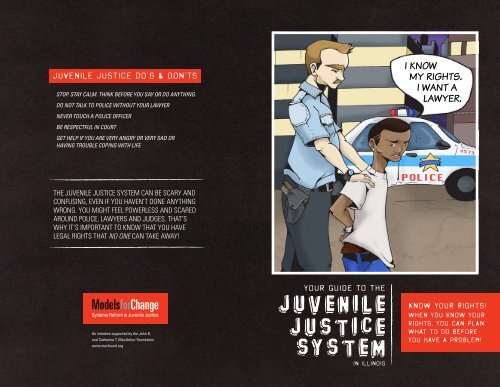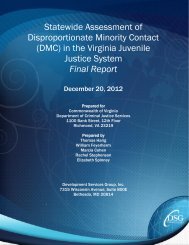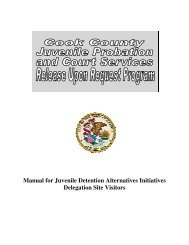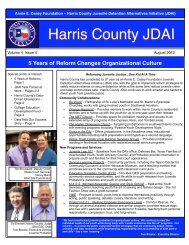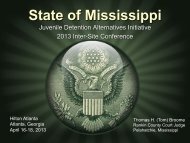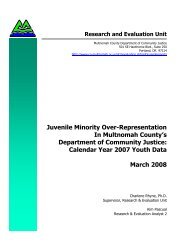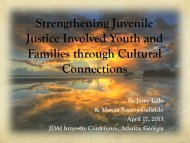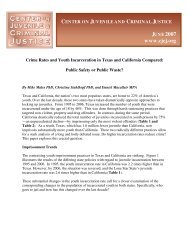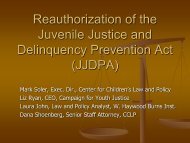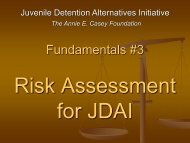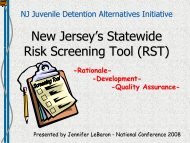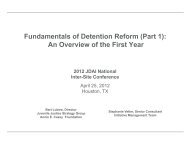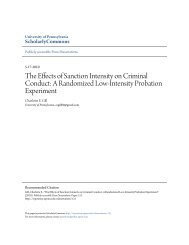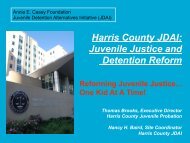Your Guide to the Juvenile Justice System in Illinois - National ...
Your Guide to the Juvenile Justice System in Illinois - National ...
Your Guide to the Juvenile Justice System in Illinois - National ...
Create successful ePaper yourself
Turn your PDF publications into a flip-book with our unique Google optimized e-Paper software.
JUVENILE JUSTICE DO’S & DON’TS<br />
STOP. STAY CALM. THINK BEFORE YOU SAY OR DO ANYTHING.<br />
DO NOT TALK TO POLICE WITHOUT YOUR LAWYER<br />
I KNOW<br />
MY RIGHTS.<br />
I WANT A<br />
LAWYER.<br />
NEVER TOUCH A POLICE OFFICER<br />
BE RESPECTFUL IN COURT<br />
GET HELP IF YOU ARE VERY ANGRY OR VERY SAD OR<br />
HAVING TROUBLE COPING WITH LIFE<br />
THE JUVENILE JUSTICE SYSTEM CAN BE SCARY AND<br />
CONFUSING, EVEN IF YOU HAVEN’T DONE ANYTHING<br />
WRONG. YOU MIGHT FEEL POWERLESS AND SCARED<br />
AROUND POLICE, LAWYERS AND JUDGES. THAT’S<br />
WHY IT’S IMPORTANT TO KNOW THAT YOU HAVE<br />
LEGAL RIGHTS THAT NO ONE CAN TAKE AWAY!<br />
YOUR GUIDE TO THE<br />
An <strong>in</strong>itiative supported by <strong>the</strong> John D.<br />
and Ca<strong>the</strong>r<strong>in</strong>e T. MacArthur Foundation<br />
www.macfound.org<br />
KNOW YOUR RIGHTS!<br />
When you know your<br />
rights, you can plan<br />
what <strong>to</strong> do before<br />
you have a problem!<br />
IN ILLINOIS
This publication was prepared for <strong>the</strong> Ill<strong>in</strong>ois Mental Health and <strong>Juvenile</strong> <strong>Justice</strong> Action Network by Jean<br />
Davidson Meister, project manager, and Kim Miller, both of <strong>the</strong> Ill<strong>in</strong>ois Children’s Mental Health Partnership;<br />
Elg<strong>in</strong>-Bokari T. Smith, illustra<strong>to</strong>r, and Julie Biehl, Children and Family <strong>Justice</strong> Center, Northwestern University<br />
School of Law. Graphic design by Ashley Kittrell.<br />
This publication was developed as part of <strong>the</strong> Family Involvement Workgroup of <strong>the</strong> Mental Health/<strong>Juvenile</strong><br />
<strong>Justice</strong> Action Network, coord<strong>in</strong>ated by <strong>the</strong> <strong>National</strong> Center for Mental Health and <strong>Juvenile</strong> <strong>Justice</strong>.<br />
The preparation of this document was supported by <strong>the</strong> John D. and Ca<strong>the</strong>r<strong>in</strong>e T. MacArthur Foundation.<br />
Anyone may use <strong>the</strong> content of this publication as is for educational purposes as often and for as many people as<br />
wished. All we ask is that you identify <strong>the</strong> material as be<strong>in</strong>g <strong>the</strong> property of <strong>the</strong> Children and Family <strong>Justice</strong> Center,<br />
Northwestern University School of Law, and <strong>the</strong> Ill<strong>in</strong>ois Children’s Mental Health Partnership. This publication may<br />
be downloaded at: www.law.northwestern.edu/cfjc or www.icmhp.org<br />
The Ill<strong>in</strong>ois Mental Health and <strong>Juvenile</strong> <strong>Justice</strong> Action Network thanks <strong>the</strong> family engagement advisory committee<br />
members who participated <strong>in</strong> every stage of development of this graphic novel <strong>in</strong>clud<strong>in</strong>g: Cheryl Anderson, Pillars,<br />
The Fillmore Center; Meghan Carter, Legal Assistance Foundation; Es<strong>the</strong>r Franco-Payne, Chicago Metropolis<br />
2020; Stephanie Frank, LCSW; Lisa Jacobs, Ill<strong>in</strong>ois Models for Change, Loyola University School of Law; Jennifer<br />
Jaworski, Ill<strong>in</strong>ois Department of <strong>Juvenile</strong> <strong>Justice</strong>; An<strong>to</strong><strong>in</strong>ette Kavanaugh, forensic psychologist; Miquel Lewis,<br />
(committee co-chair) Cook County <strong>Juvenile</strong> Court, Probation Department; Colette Lueck, Ill<strong>in</strong>ois Children’s Mental<br />
Health Partnership; Kim Miller, (committee co-chair) Ill<strong>in</strong>ois Children’s Mental Health Partnership, Heidi Mueller,<br />
Youth Outreach Services; Vikki Rompala, La Rabida Children’s Hospital.<br />
The Ill<strong>in</strong>ois Mental Health and <strong>Juvenile</strong> <strong>Justice</strong> Action Network also s<strong>in</strong>cerely thanks all of <strong>the</strong> youths and family<br />
members who participated <strong>in</strong> focus groups and shared <strong>the</strong>ir experiences <strong>in</strong> <strong>the</strong> Ill<strong>in</strong>ois juvenile justice system.<br />
YES.<br />
AM I FREE<br />
TO GO?<br />
Models for Change<br />
Models for Change is an effort <strong>to</strong> create successful and replicable models of juvenile justice reform through<br />
targeted <strong>in</strong>vestments <strong>in</strong> key states, with core support from <strong>the</strong> John D. and Ca<strong>the</strong>r<strong>in</strong>e T. MacArthur Foundation.<br />
Models for Change seeks <strong>to</strong> accelerate progress <strong>to</strong>ward a more effective, fair, and developmentally sound juvenile<br />
justice system that holds young people accountable for <strong>the</strong>ir actions, provides for <strong>the</strong>ir rehabilitation, protects<br />
<strong>the</strong>m from harm, <strong>in</strong>creases <strong>the</strong>ir life chances, and manages <strong>the</strong> risk <strong>the</strong>y pose <strong>to</strong> <strong>the</strong>mselves and <strong>to</strong> <strong>the</strong> public. The<br />
<strong>in</strong>itiative is underway <strong>in</strong> Ill<strong>in</strong>ois, Pennsylvania, Louisiana, and Wash<strong>in</strong>g<strong>to</strong>n, and through action networks focus<strong>in</strong>g<br />
on key issues, <strong>in</strong> California, Colorado, Connecticut, Florida, Kansas, Maryland, Massachusetts, New Jersey, North<br />
Carol<strong>in</strong>a, Ohio, Texas, and Wiscons<strong>in</strong>.<br />
s<strong>to</strong>p. stay calm.<br />
th<strong>in</strong>k before you say or do anyth<strong>in</strong>g.<br />
You DO NOT have <strong>to</strong> talk <strong>to</strong> police, no matter what police say.<br />
You have a right <strong>to</strong> a lawyer, and police are supposed <strong>to</strong> s<strong>to</strong>p question<strong>in</strong>g you as soon<br />
as you ask for one.<br />
The police are supposed <strong>to</strong> contact your parent or an adult family member <strong>to</strong> tell <strong>the</strong>m that<br />
you have been arrested. If you are s<strong>to</strong>pped by police, stay calm and ask, “Am I free <strong>to</strong> go?”<br />
If <strong>the</strong> answer is yes, leave right away. If <strong>the</strong> answer is no, tell police you want a lawyer<br />
AND an adult family member. Don’t say ANOTHER th<strong>in</strong>g.<br />
1
I<br />
DON’T<br />
WANT<br />
TO TALK.<br />
IF YOU ARE ARRESTED<br />
or held by police, tell police,<br />
“I don’t want <strong>to</strong> talk.” Just<br />
give your name and how <strong>to</strong><br />
reach a parent or an adult<br />
family member. Even simple<br />
<strong>in</strong>formation, like where you<br />
were on a certa<strong>in</strong> date,<br />
could hurt you later.<br />
THE LAW ALLOWS POLICE<br />
TO SAY THINGS THAT ARE<br />
NOT TRUE <strong>to</strong> get <strong>in</strong>formation<br />
from you. For example, police<br />
might say that you can go home<br />
if you talk, or that someone<br />
says that he saw you commit a<br />
crime, even if this is not true.<br />
I WANT<br />
TO SEE<br />
MY CHILD!<br />
TELL POLICE HOW TO REACH YOUR PARENT or an<br />
adult family member. You should also tell police your<br />
name, address and date of birth.<br />
IF YOU REFUSE TO TALK<br />
it doesn’t mean you are guilty!<br />
You will have a chance <strong>to</strong> tell<br />
your side of <strong>the</strong> s<strong>to</strong>ry later, with<br />
your lawyer <strong>to</strong> help you.<br />
TELL POLICE THAT YOU WANT<br />
A LAWYER. You have a right <strong>to</strong><br />
a lawyer, even if you can’t pay<br />
for one. The court system will<br />
give you a lawyer for free. Don’t<br />
say anyth<strong>in</strong>g more, and don’t sign<br />
anyth<strong>in</strong>g. Wait for your lawyer<br />
<strong>to</strong> help you!<br />
OK, WHAT<br />
HAPPENED?<br />
DON’T SAY<br />
ANYTHING UNTIL<br />
WE TALK TO YOUR<br />
LAWYER.<br />
COME<br />
GET<br />
ME!<br />
You DO NOT have <strong>to</strong> talk <strong>to</strong><br />
police, but you DO have <strong>to</strong><br />
follow <strong>the</strong>ir <strong>in</strong>structions.<br />
Police might search you or<br />
handle you roughly. Don’t<br />
talk back, and keep your<br />
hands where police can<br />
see <strong>the</strong>m. NEVER <strong>to</strong>uch<br />
a police officer.<br />
EVERYBODY<br />
FEELS SCARED<br />
<strong>in</strong> police cus<strong>to</strong>dy.<br />
You don’t have <strong>to</strong><br />
go through it alone.<br />
2<br />
3
YOUR<br />
HONOR,<br />
I HAVE A<br />
QUESTION.<br />
YOU HAVE A RIGHT TO SPEAK IN COURT<br />
If you don’t understand someth<strong>in</strong>g, ask your lawyer<br />
or <strong>the</strong> judge BEFORE you leave court. If you still<br />
don’t understand, ASK aga<strong>in</strong>, and keep ask<strong>in</strong>g until<br />
you get <strong>the</strong> <strong>in</strong>formation you need.<br />
YOU HAVE A RIGHT TO A TRIAL<br />
This is YOUR choice. Don’t be pressured <strong>to</strong> plead<br />
guilty, even if you are <strong>to</strong>ld that you will be able <strong>to</strong> go<br />
home sooner. Take time <strong>to</strong> decide, because this choice<br />
will affect <strong>the</strong> rest of your life. A guilty plea could<br />
mean you will go <strong>to</strong> jail or be on probation for years.<br />
If you have a trial, you could be found not guilty.<br />
IF YOU ARE CHARGED WITH A<br />
JUVENILE CRIME,You could be<br />
sent home or held <strong>in</strong> cus<strong>to</strong>dy<br />
until your detention hear<strong>in</strong>g.<br />
ALWAYS SHOW RESPECT<br />
when you speak <strong>to</strong> <strong>the</strong><br />
judge and o<strong>the</strong>rs <strong>in</strong> court.<br />
Call <strong>the</strong> judge “<strong>Your</strong> Honor.”<br />
Be on time.<br />
DRESS NEATLY. Wear a<br />
collared shirt if you have one,<br />
and cover tat<strong>to</strong>os if you can.<br />
Leave your hat at home, and<br />
turn off your cell phone.<br />
I KNOW<br />
JUST THE<br />
PLACE TO<br />
PUT THIS.<br />
WRITE DOWN<br />
EVERYTHING<br />
or ask a family member<br />
<strong>to</strong> help you keep track<br />
of <strong>the</strong> names of police<br />
officers, your lawyer,<br />
probation officer and<br />
<strong>the</strong> judge. Get phone<br />
numbers <strong>to</strong>o. Keep all<br />
notes and all letters<br />
about court dates or<br />
probation rules <strong>in</strong> a<br />
safe place, where<br />
you can f<strong>in</strong>d <strong>the</strong>m.<br />
This <strong>in</strong>formation is<br />
important!<br />
4<br />
5
THE JUDGE’S RULING<br />
IF YOU ARE SENT TO A JUVENILE DETENTION CENTER<br />
OR AN ILLINOIS YOUTH CENTER:<br />
Follow <strong>the</strong> rules! If you don’t your sentence could be made longer and longer.<br />
If you don’t follow <strong>the</strong> rules <strong>in</strong> <strong>the</strong> m<strong>in</strong>imum-security youth center where most youths<br />
are sent first, you could also be sent <strong>to</strong> a higher security youth center.<br />
I’M<br />
STARTING<br />
TO GET<br />
THIS.<br />
COOPERATE<br />
IN THERAPY<br />
AND GO TO<br />
SCHOOL<br />
Ask for help if<br />
you are very sad<br />
or very angry.<br />
Take advantage<br />
of chances <strong>to</strong> go<br />
<strong>to</strong> school or <strong>to</strong><br />
job tra<strong>in</strong><strong>in</strong>g.<br />
IF THE JUDGE DECIDES THAT YOU ARE NOT GUILTY,<br />
THE CASE IS OVER AND YOU CAN GO HOME<br />
IF THE JUDGE DECIDES THAT YOU ARE GUILTY,<br />
YOU COULD BE SENTENCED TO:<br />
Probation and allowed <strong>to</strong> go home<br />
Receive counsel<strong>in</strong>g and/or substance abuse treatment<br />
Placement <strong>in</strong> a residential treatment center<br />
Serve time <strong>in</strong> a juvenile detention center<br />
Serve time <strong>in</strong> a juvenile prison, called an Ill<strong>in</strong>ois Youth Center<br />
AFTER THE JUDGE RULES IN YOUR CASE:<br />
Follow all probation rules!<br />
If you don’t understand <strong>the</strong> rules, ASK!<br />
If you break <strong>the</strong> rules, you could go <strong>to</strong> jail.<br />
ARE YOU<br />
OKAY?<br />
WE’VE<br />
MISSED<br />
YOU.<br />
I’VE<br />
MISSED<br />
YOU TOO.<br />
6<br />
YOU HAVE A RIGHT TO APPEAL THE JUDGE’S DECISION<br />
This means that ano<strong>the</strong>r judge will decide if it is a good decision or a bad decision.<br />
You have <strong>to</strong> decide fast, because you have only 30 days after sentenc<strong>in</strong>g.<br />
You can get a lawyer <strong>to</strong> file your appeal for free.<br />
YOUR FAMILY IS IMPORTANT<br />
Stay <strong>in</strong> <strong>to</strong>uch with calls and visits. Family <strong>the</strong>rapy can help <strong>to</strong>o.<br />
7
ASK FOR HELP<br />
You will need support.<br />
Lean on your family,<br />
friends, your church,<br />
men<strong>to</strong>rs or community<br />
leaders. Look for counsel<strong>in</strong>g<br />
near your home.<br />
Get <strong>in</strong>volved <strong>in</strong> school,<br />
a job, or someth<strong>in</strong>g<br />
else you enjoy.<br />
START FRESH<br />
An expungement erases<br />
your juvenile record, so you<br />
can get a job, go <strong>to</strong> college<br />
or jo<strong>in</strong> <strong>the</strong> military. You don’t<br />
need a lawyer <strong>to</strong> get an<br />
expungement. You can f<strong>in</strong>d<br />
forms and <strong>in</strong>formation about<br />
how <strong>to</strong> get an expungement<br />
at <strong>the</strong> court clerk’s office.<br />
YOUR<br />
RECORD<br />
IS<br />
CLEAN!<br />
WHEN YOU ARE RELEASED<br />
WHEN YOU GET OUT, STAY OUT!<br />
Get help if you are sad or angry or hav<strong>in</strong>g trouble cop<strong>in</strong>g with life.<br />
It’s a big change <strong>to</strong> return <strong>to</strong> regular life, and it’s normal <strong>to</strong> struggle<br />
for awhile. It helps <strong>to</strong> talk <strong>to</strong> somebody who understands. A doc<strong>to</strong>r<br />
or a social worker can help you with emotional issues or trauma.<br />
In a crisis, you can call CARES (800-345-9049).<br />
8<br />
9
WHO’S WHO IN THE COURTROOM<br />
THE JUDGE<br />
The judge is <strong>in</strong> charge of <strong>the</strong> courtroom. The judge listens <strong>to</strong> <strong>in</strong>formation from<br />
your probation officer, lawyers, witnesses, and you. Based on this evidence,<br />
<strong>the</strong> judge decides if you are guilty or not guilty and sets <strong>the</strong> sentence.<br />
THE STATE’S ATTORNEY<br />
The state’s at<strong>to</strong>rney represents <strong>the</strong> people of Ill<strong>in</strong>ois. The state’s at<strong>to</strong>rney’s job<br />
is <strong>to</strong> prove that charges aga<strong>in</strong>st you are true. To do this, he or she presents<br />
evidence and witnesses aga<strong>in</strong>st you.<br />
DEFENSE LAWYER OR PUBLIC DEFENDER<br />
The defense lawyer works for you. The defense lawyer’s job is <strong>to</strong> tell you about<br />
<strong>the</strong> law and your choices, and <strong>to</strong> present evidence and witnesses <strong>to</strong> help you.<br />
If you cannot pay for a private lawyer, <strong>the</strong> court will appo<strong>in</strong>t a lawyer called a<br />
public defender for free.<br />
PROBATION OFFICER<br />
The probation officer learns about your needs, sets up services for you, gives<br />
<strong>in</strong>formation <strong>to</strong> <strong>the</strong> judge, and supervises you while you are on probation.<br />
CLERK<br />
The clerk is seated next <strong>to</strong> <strong>the</strong> judge. The clerk is responsible for all legal<br />
records and <strong>in</strong>formation about <strong>the</strong> cases before <strong>the</strong> judge.<br />
DEPUTY SHERIFF<br />
A deputy sheriff is assigned <strong>to</strong> each courtroom <strong>to</strong> keep order and security<br />
<strong>in</strong> <strong>the</strong> court.<br />
1.<br />
2.<br />
3.<br />
FACTS YOU SHOULD KNOW<br />
If you are under 18, you are a juvenile accord<strong>in</strong>g <strong>to</strong> Ill<strong>in</strong>ois law, but that doesn’t<br />
always mean you will go <strong>to</strong> juvenile court. If you are under 17, you will go <strong>to</strong><br />
juvenile court for most charges. However, you could go <strong>to</strong> adult court if you are<br />
over 15 and charged with a very serious crime such as murder, rape and certa<strong>in</strong><br />
crimes committed with a gun.<br />
If you are under 10, you can be charged with a crime, but you can’t be sent <strong>to</strong> a<br />
juvenile detention center.<br />
If you don’t speak English, you can get an <strong>in</strong>terpreter for free <strong>in</strong> court and <strong>to</strong><br />
speak with your lawyer.<br />
4. It is important <strong>to</strong> know that a youth officer is a police officer.<br />
5.<br />
6.<br />
7.<br />
8.<br />
In juvenile court, <strong>the</strong> first court hear<strong>in</strong>g is called a detention hear<strong>in</strong>g. At a<br />
detention hear<strong>in</strong>g, <strong>the</strong> judge decides if <strong>the</strong>re is enough evidence <strong>to</strong> believe you<br />
committed a crime, if your case should go <strong>to</strong> trial, and whe<strong>the</strong>r you can go home.<br />
In juvenile court, sentenc<strong>in</strong>g is called disposition. At <strong>the</strong> disposition, a judge<br />
sets <strong>the</strong> penalty for a juvenile crime.<br />
Probation is a period of time when you must follow rules set by <strong>the</strong> court.<br />
Dur<strong>in</strong>g this time, you are supervised by a probation officer.<br />
Parole is a period of time after you are released from <strong>the</strong> Ill<strong>in</strong>ois Department<br />
of <strong>Juvenile</strong> <strong>Justice</strong> when you must follow ALL parole rules. Parole usually<br />
lasts until you are 21. Dur<strong>in</strong>g your time on parole, you are supervised by a<br />
parole officer. If you break parole rules, you can be sent <strong>to</strong> <strong>the</strong> Ill<strong>in</strong>ois<br />
Department of <strong>Juvenile</strong> <strong>Justice</strong>.<br />
10<br />
11
IMPORTANT INFORMATION<br />
MY LAWYER’S NAME<br />
PHONE NUMBER<br />
MY PROBATION OFFICER’S NAME<br />
JAIL IS A PLACE<br />
NOBODY WANTS TO BE<br />
Maybe you know people who say it’s no big deal.<br />
That’s wrong. Jail is an awful place, and it can affect<br />
<strong>the</strong> way you feel for a long, long time.<br />
PHONE NUMBER<br />
MY JUDGE’S NAME<br />
COURTROOM NUMBER<br />
COURT DATES AND TIMES<br />
OTHER IMPORTANT PEOPLE<br />
12


